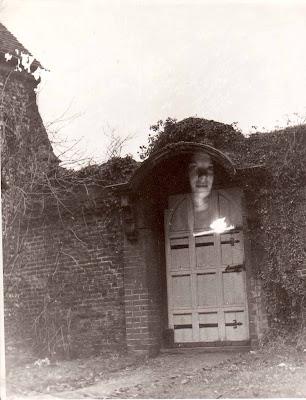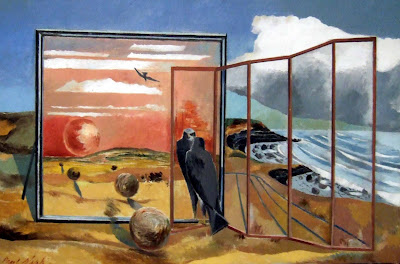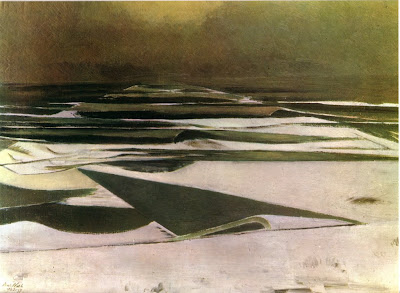Last Friday I boarded a train to Rye, where I'd arranged to meet an old schoolfriend. I was looking forward to the journey and congratualted myself when I found an empty table seat by the window, but then I was joined by this man:
 I'd seen him minutes earlier, sprawled horizontally across a bench. He was in his 60s, with a distinctive leather trilby and a shirt that was unbuttoned down to the navel. If I'd had any sense, I wouldn't have picked the one seat in the carriage where he could assume a similar position.
I'd seen him minutes earlier, sprawled horizontally across a bench. He was in his 60s, with a distinctive leather trilby and a shirt that was unbuttoned down to the navel. If I'd had any sense, I wouldn't have picked the one seat in the carriage where he could assume a similar position.At first he seemed harmless enough, nodding off within seconds of leaving Lewes. A few people glanced nervously in our direction and I felt slightly superior for not being fazed by my companion. What was their problem? He was just a harmless old drunk, looking for a nice comfy seat.
We arrived at Eastbourne and a speaker announced: "BING BONG. THIS IS EASTBOURNE. WE ARE NOW AT EASTBOURNE. PLEASE CHANGE HERE FOR..." At which point my companion suddenly bolted upright, as if he'd received an electric shock:
"Eastbourne? I want Ashford. There are THOUSANDS in Ashford. Thousands. I don't 'ave to worry. Ah'll be alright. Ah've got money and there's more in Ashford." I couldn't tell who he was talking to, but years of listening to ruddy-faced men who stank of rum had taught to avoid eye contact at all costs.
"D'you smoke?" It was a direct question. I couldn't just ignore him. I remember a man in London asking me the same question years ago and when I explained that I'd just given up, he shouted "I asked for a cigarette, not your fucking life story!"
I said no. He stared for a few seconds and announced "I smoke green weed. Green weed." I barely acknowledged him and returned to my newspaper, hoping that my companion would go back to sleep, but he had other ideas.
On the opposite seats were a teenage girl and boy. The girl had one of the most absurdly posh faces that I've ever seen, with a long nose and small, pouty lips, like a young Penelope Keith. It was a face that said "Cripes, I hear old Squeaky Dawson's been drummed out of the lacrosse team!" It was not the sort of face that would endear itself to my companion. He stared at her.
"I don't like you. I don't like you at all." Now he was becoming a nuisance.
"I don't mind...errr...hmmm...errr...yeah, but paedophiles...PAEDOPHILES! I'd shoot 'em. BANG! With a shotgun. Fuck 'em. Whoops. Sorry. can't say that."
At this point he spat on the seat, narrowly missing me. His eyes closed for a few seconds, then he suddenly leant forward and looked accusingly at me.
"Paaeedddophiles..." He gurgled like Gollum and started to retch. I didn't have a change of clothes, so changing seats was probably the best course of action, but the stubborn part of me refused to move and like an idiot, I subjected myself to a further 20 minutes of madness
Half an hour later, I was in the beer garden of The George in Rye, drinking a pint of Harvey's, getting slowly sunburned. I have know my friend since I was 12 and in some ways we have led parallel lives, growing up as cuckoos in the nests of working class families. Our parents didn't understand how they'd given birth to sons who liked classical music and had an absurd interest in European royalty, but to their credit they encouraged us.
In my friend's case, when he started drawing pictures of violins at the age of five, his parents responded by arranging for him to have music lessons. They weren't pushy, upwardly-mobile parents. Indeed, their idea of a good night out was playing darts at the British Legion, but perhaps they'd had thwarted ambitions in their youth and didn't want to repeat history. My friend ended up being taught by someone who'd trained with Joachim, who was a friend of Brahms.
His parents did everything they could to encourage their son's talent. On a caravan holiday in Hayling Island, the whole family dutifully sat through a live broadcast of Schoenberg's Survivor from Warsaw, oblivious to the fact that it had nothing to do with the violin repertoire.
My friend began a music degree, but he found his fellow music students too insular. When he met some students from the Yehudi Menuin School who didn't know who the leader of the Labour Party was, he quit and started a BSc in Sociology. When he graduated, my friend stumbled into business publishing and within seven years, he was earning a basic salary of £40,000.
At this point my friend went through a crisis. He'd blagged his way into a job that he had no interest or expertise in and to his surprise, he kept getting promoted. With each promotion, he felt increasingly unreal and was depressed by the ease with which he could pretend to be something he wasn't.
One day, my friend handed in his notice. Next, he sold his flat in Twickenham for £120,000, paid off his mortgage and bought another flat in Kent for £60,000. Since then, he has earned a living by playing the fiddle in bands at folk festivals. He is happy.
For those of us who don't have Grade 8 violin and 50% equity on our property, life can be rather more challenging, but the principal remains the same. Do we risk pursuing happiness at the possible expense of hard-won achievements, or should we be grateful for what we have?









































